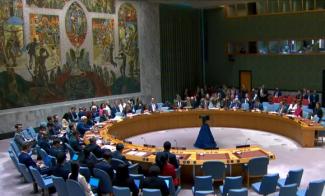
New York (UN), 17 October 2024 (SPS) - The UN Security Council held closed-door consultations on Wednesday evening in New York regarding the United Nations Mission for the Referendum in Western Sahara (MINURSO).
Under the presidency of Switzerland, the Council heard a briefing from the UN Secretary-General's Personal Envoy for Western Sahara, Staffan de Mistura, who presented the results of his activities over the past few months, including his visit to the Sahrawi side on October 3rd.
The Secretary-General's Special Representative and head of MINURSO, Alexander Ivanko, gave a presentation on developments on the ground in the mission’s area of operation.
On the eve of the Security Council meeting, UN Secretary-General Antonio Guterres released his report on the situation concerning Western Sahara, in which he deemed it “more urgent than ever” to “reach a just, lasting, and mutually acceptable political solution that allows for the self-determination of the people of Western Sahara,” in accordance with relevant Security Council resolutions, recommending that the Council extend MINURSO's mandate by one year.
For his part, Sahrawi President Brahim Ghali sent a letter to the UN Secretary-General outlining the Sahrawi side’s position on certain elements contained in Antonio Guterres' report regarding Western Sahara.
The letter states that Western Sahara is an issue recognized by the United Nations as a decolonization matter to which UN General Assembly resolution 1514, related to the Declaration on the Granting of Independence to Colonial Countries and Peoples, applies.
“Therefore, any solution to the question of Western Sahara must fully respect and guarantee the inalienable right of the Sahrawi people to self-determination and independence,” insists Brahim Ghali.
The letter noted the Secretary-General's call in his observations and recommendations to refrain from setting preconditions, which, according to Mr. Ghali, sends a very clear message to the Moroccan occupation to stop setting "preconditions" for engaging in the peace process, and serves as a direct response to the position expressed by its Prime Minister before the General Assembly last month.